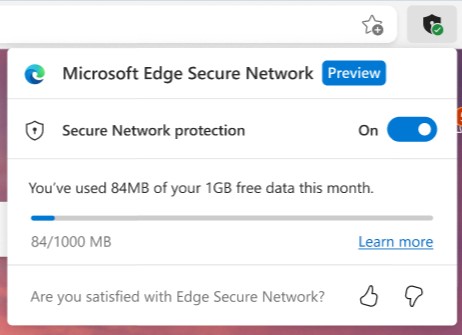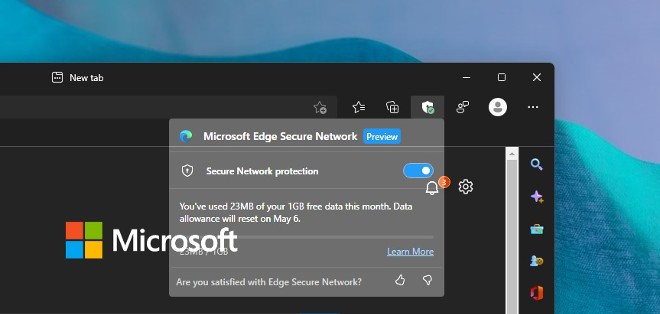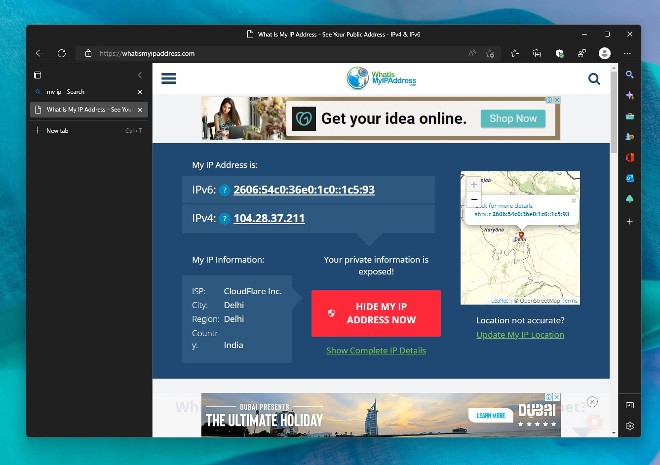Try the built-in VPN on Microsoft Edge browser
A VPN, or virtual private network, is a great way to instantly improve your online security. However, using a VPN usually requires you to install additional software or pay an additional fee.
To make things easier for users, Microsoft has just announced that it will integrate VPN directly into its Chromium-based Edge browser. With VPN tools directly integrated, the value of the Microsoft Edge browser for users will increase significantly.
Microsoft Edge's VPN feature will be called "Microsoft Secure Edge Network" and it will be powered by Cloudflare. It will likely work similarly to Cloudflare's 1.1.1.1 service.

The advantage of Cloudflare virtual private network is that it enhances online security, your data is protected from the prying eyes of internet service providers (ISPs) as well as hides your location.
"When using Microsoft Edge Secure Network, your data is routed from Edge through an encrypted tunnel to create a secure connection even when you use an insecure URL that starts with HTTP. This makes it difficult for hackers to access your browsing data when you're on public WiFi.
By encrypting your web traffic directly from Microsoft Edge, we help prevent your internet service provider from collecting your browsing data, such as details about which websites you visit. Microsoft Edge Secure Network also lets you browse with a virtual IP address, masking your real IP and replacing your geographic location with a similar regional address to make it harder for online trackers to follow you as you browse the web ," Microsoft shared.
Microsoft's built-in VPN service in Edge is currently in beta testing on the Dev channel. To use the feature, you'll need to sign in to a Microsoft account. Although it's free, the VPN service only offers a 1GB monthly data limit. The data limit is tied to your Microsoft account and is refreshed by Cloudflare at the end of each month. Personally identifiable data is deleted every 25 hours.
Try the built-in VPN on Microsoft Edge
As mentioned above, Edge Secure Network uses Cloudflare to encrypt traffic through one of the world's largest DNS servers. Similar to VPN services, Microsoft Edge's Cloudflare VPN can prevent online tracking by encrypting your traffic and keeping your location private.

Your internet service provider cannot monitor your activities because your IP address is replaced with Cloudflare's IP address and data is transmitted over an encrypted tunnel to create a secure connection. This means you will have a safe browsing experience even when accessing insecure URLs or pages that start with HTTP or use untrusted SSL certificates.
Other benefits of built-in VPN on Microsoft Edge:
- Microsoft Edge's anti-tracking features make it harder for hackers to access your data.
- Prevent data sharing with public WiFi.
- Your data cannot be linked to the browser because the traffic is routed through Cloudflare and your IP is masked.
Is Microsoft Edge's built-in VPN a replacement for real VPN solutions?
In fact, the built-in VPN in Microsoft Edge doesn't have a location protection solution. Edge lets you surf the web using a Cloudflare IP address but the location is similar to your region. That's because Cloudflare Warp isn't designed to spoof your location.
As a result, you can't change servers. This means you can't use Edge's VPN to watch geo-restricted content. However, you can still use it to unblock services blocked by your internet service provider (ISP).
True VPN services, on the other hand, give you more control over your geographic location and IP address. Most services have a huge network of servers for you to choose from.

Another issue is that users will only get 1GB of free data per month. To get free data, you have to sign in to a Microsoft account. This is quite a contradiction because Cloudflare Warp is a free service.
It's unclear at this point whether Microsoft is considering introducing paid plans. According to the support document, Microsoft will consider any issues based on user feedback.
Microsoft Edge Secure Network is a good solution to prevent or reduce online tracking. But it is certainly not a replacement for a legitimate VPN product or service.
If you want to try VPN on Edge, you can download Edge Canary and enter Edge://vpn in the address bar to activate it. However, you should note that Microsoft is not rolling out this feature randomly, not to all users who download Edge Canary, so only the lucky ones will be able to try it.
You should read it
- Fix Microsoft Edge using RAM on Windows 10
- Microsoft Edge is about to add a series of features to support remote work and enhance security
- Microsoft Edge is about to integrate YouTube with the Discover feature, promising many interesting experiences
- Manage and delete browsing data on Microsoft Edge
- How to allow Pop-Up window to be displayed in Microsoft Edge
- New Edge is very similar to Chrome, so is there any reason to switch from Chrome to Edge?
 Top 5 AI Tools on Canva
Top 5 AI Tools on Canva 23 Free Ways to Download Any Video from the Internet
23 Free Ways to Download Any Video from the Internet Roundup of new Chrome features and security updates
Roundup of new Chrome features and security updates Instructions for converting numbers to words in Excel
Instructions for converting numbers to words in Excel 11 Awesome Ways to Use the Canva App
11 Awesome Ways to Use the Canva App How to change your Google account profile picture
How to change your Google account profile picture